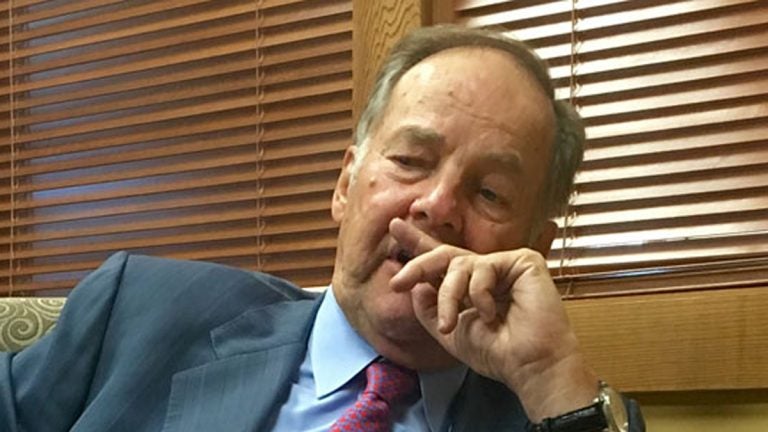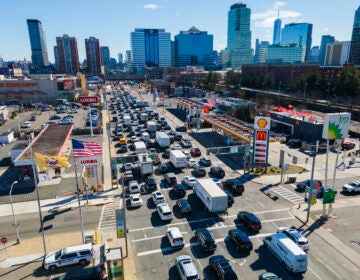9/11 Commission chair: ‘Unless we defeat the ideology, we’re not going to win’

Tom Kean served as chairman of the 9/11 Commission. He served as governor of New Jersey from 1982 to 1990. (Photo courtesy of NJ Spotlight)
For the 15th anniversary of the September 11th attacks, former Gov. Thomas Kean and former U.S. Sen. Lee Hamilton — the co-chairmen of the 9/11 Commission — last week announced they would redouble their commitment with a new national effort.
This time, they would co-chair a project out of Washington, D.C., to recommend new steps in the United States’ war on terrorism that were not military, not intelligence, but would go at the radical ideologies that have spawned the violence.
“The conclusion I came to is we are not doing that well, and we should rethink the effort,” a sober Kean said Friday.
NJ Spotlight’s John Mooney sat with Kean at his Far Hills office on Friday and talked about the new project, as well as his thoughts on how much progress the United States has — and has not — made since the 9/11 Commission’s last recommendations.
NJ Spotlight: What’s your aim with this new effort?
Kean: If you look at the world today and all the money and time we’ve spent, the one good thing is we have been able to prevent — I guess prevent — any massive attack like 9/11.
But we have gotten more and more of these inspired self-starters who watch the Internet and go from there. In the rest of the world, the attacks are increasing by six times — six times more attacks than 10 years ago, six times. And the areas from where they attack have metastasized. So when we were talking al Qaida and bin Laden, it was just Afghanistan. Now it’s the Middle East, it’s the Horn of Africa. They are attacking from all these other areas.
Plus, the one thing they were very concerned about with 9/11 and we said ‘never again:’ we couldn’t let them have space to plan and operate. It took three to four years to plan and operate 9/11. But they have that now, ISIS has had space to plot for three or four years, so heaven knows what they planning.
The conclusion I came to is we are not doing that well, and we should rethink the effort. It doesn’t mean we should stop doing the homeland security stuff we are doing, a lot of that is good and necessary and has made it safer. But the only other thing we are doing is boots on the ground. And as I look at this, it is an ideology, it is not anything else, it’s not nations, it’s ideology. And unless we defeat the ideology, we’re not going to win.
And you don’t defeat ideology just using troops and homeland security measures. You have to use the full panoply of all our powers, and that means economic, that means cultural, that means a whole raft of things like we used to end the Cold War. We didn’t go after communism with just boots on the ground and homeland security, we went after it with a raft of things, Radio Free Europe, the Marshall Plan, a whole series of stuff.
NJ Spotlight: Do you say that is not happening at all? It may not be successful, but isn’t that happening?
Kean: It is not happening to this extent. I’ll give you an example as to what I mean. The largest Islamic country in the world is Indonesia. If you poll Islamic countries, the U.S. has somewhere between 15 percent and 25 percent favorability in all countries, even Egypt, where we pour tons of money. That was true in Indonesia, too — until they had the tsunami. And when they did, we really took it to heart, we raised money privately and publicly, we sent troops over with aid, with food, we put the two former Presidents Bush and Clinton at the head of it. Six months later, they took another poll: 70 percent of the people in that country had a good opinion of the U.S. It’s not that high any more, but it’s a lot better than any other [Muslim] country, still over 50 percent. That’s a lot cheaper than war.
NJ Spotlight: So you are convening a taskforce like the 9/11 Commission?
Kean: We can’t reconvene the 9/11 Commission, their lives are all over the place. But we have a place in Washington in the Bipartisan Policy Center, founded by two Republican leaders and two Democrat leaders in Congress — Bob Dole, George Mitchell, Howard Baker and Tom Daschle — whose mission is to come up with bipartisan solution to problems. So our work will come out of the center. Lee Hamilton and I will co-chair it, and we’ll bring in some of the brightest people we know on the whole subject of the war on terror. And what we’ll do is hopefully come up with a series of recommendations for the new president and the new Congress. We hope it will be ready this spring.
NJ Spotlight: And we’re talking ideas that are nonmilitary, nonintelligence?
Kean: It doesn’t mean that we won’t need to use troops, and it doesn’t mean we don’t have to use the other measures. But this other stuff, it’s not happening in a coordinated way. We have a number of nonprofits over there on their own. And it’s not to say we don’t have troops who are not good with the people and trying to do something. But they have a gun in the other hand, and our image over there is a man in a tank. It’s just not working, it’s simply not working.
Can we eventually ground down ISIS with ground troops? Probably. Seems to be taking much longer than it should, but probably. But ISIS will then go somewhere else, or it will metastasize to other things, and we are not going to be much better off.
NJ Spotlight: Is this a rebuke of the Obama administration?
Kean: There are two administrations, one Republican, one Democrat, that have had the same strategy, doing the same things. We want them to look at it differently, open their minds and look a different way at the problem and a different way of coming up with possible solutions.
NJ Spotlight: What you recommended through the 9/11 Commission, have those things happened? What’s the report card on what you talked about 12 years ago?
Kean: Most of them have happened. The most important recommendation was probably for the sharing of information, and if they had done that, a lot of people feel that 9/11 could have been prevented. That’s much better now. The program we came up with and Congress passed and implemented has forced information sharing through the Director of National Intelligence, that whole structure. There is a unified effort now. It’s not as good as it should be, but it’s much, much better than it was. Obviously the container ports have also been hardened, the airports have been hardened, a lot of our recommendations in those areas have been carried out.
The most important recommendation where nothing at all has been done was the one involving the Congress. We looked at all the problems leading up to 9/11, and one of them was that there was no oversight of intelligence, or no serious oversight. What we found was Tom Ridge’s agency reported to 88 different committees, so they spent a lot of their time testifying rather than protecting the country. And that’s not oversight when you’ve got 88 different committees. I testified easily a dozen times before Congress highlighting that recommendation. But it never went anywhere. And I checked recently, and it’s now 91 committees.
NJ Spotlight: What about state and local preparedness, is that better?
Kean It’s all about the federal government and state authorities and local authorities all getting together to share information, not just for terrorism but also for a hurricane or a flood. And that’s set up in New Jersey and several regions of the country, and that helps coordinate a response. That was one of our recommendations. Those are important, very, very important.
Lee and I always felt the next terrorist attack would be prevented probably by a snitch, not the FBI or CIA. It’s often some average person who sees something funny and tells somebody about it. Remember the Times Square bomber, who was doing his work in an area with more police per square foot than any in the world. And you know who caught him, it was a street vendor. That’s where it has to be seamless, from the local to the state to the feds. The locals and state are enormously important; they are the first responders; they are the ones who discover the plot long before the feds. It wasn’t seamless before, nobody was talking to each other.
_________________________________________________________
NJ Spotlight, an independent online news service on issues critical to New Jersey, makes its in-depth reporting available to NewsWorks.
WHYY is your source for fact-based, in-depth journalism and information. As a nonprofit organization, we rely on financial support from readers like you. Please give today.




